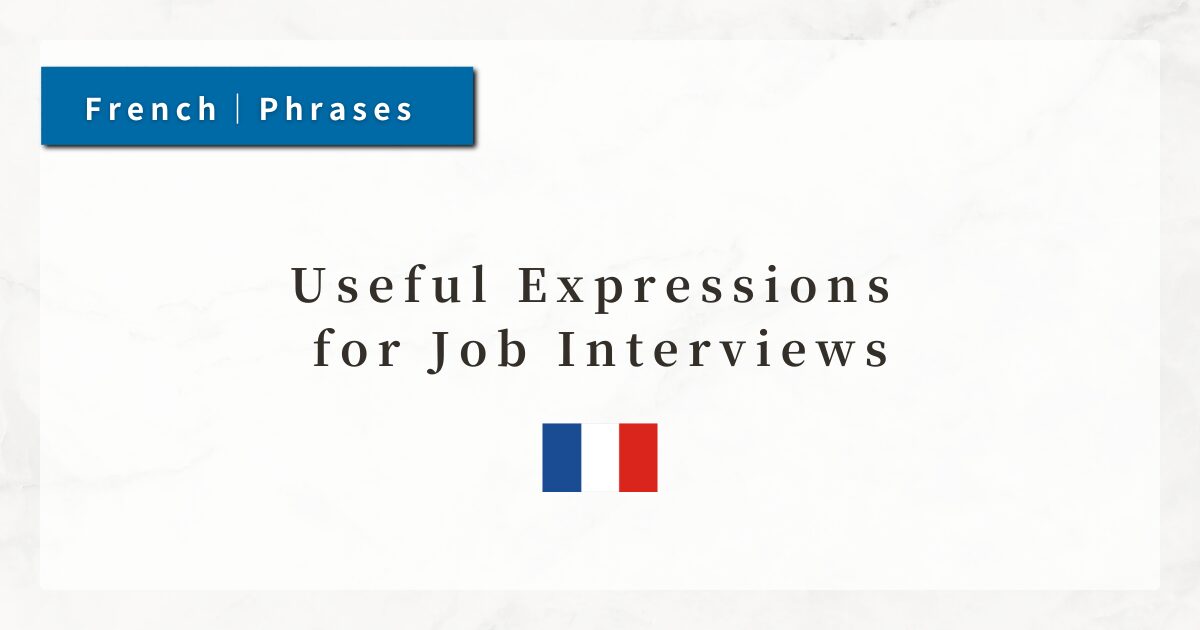#45 Useful Expressions for Job Interviews|French Business Conversation

In job or study interviews in French-speaking countries, it is essential to present yourself and your motivations clearly and concisely.
By learning common set phrases, you can respond with confidence even in stressful situations.
In this lesson, I will introduce frequently used French expressions for interviews, with explanations of their grammatical features and nuances.
Dialogue

Bonjour, présentez-vous, s’il vous plaît.
(Hello, please introduce yourself.)

Bonjour, je m’appelle Yuki Tanaka. Je viens du Japon.
(Hello, my name is Yuki Tanaka. I come from Japan.)

Pourquoi voulez-vous travailler dans notre entreprise ?
(Why do you want to work in our company?)

Parce que je suis intéressé(e) par le domaine du marketing et je voudrais développer mes compétences ici.
(Because I am interested in the field of marketing and I would like to develop my skills here.)

Avez-vous déjà de l’expérience dans ce domaine ?
(Do you already have experience in this field?)

Oui, j’ai fait un stage de six mois dans une agence de communication.
(Yes, I completed a six-month internship in a communications agency.)
1. Basics of Self-Introduction
The first question in almost every interview is self-introduction. State your name and place of origin briefly.
- Je m’appelle Marie Dupont. J’ai 23 ans et je viens de Lyon.
(My name is Marie Dupont. I am 23 years old and from Lyon.)
“Je m’appelle …” means “My name is …” and is the most common way to introduce yourself.
“Je viens de …” means “I come from …” The preposition de changes depending on the country or city:
- Je viens du Japon
- Je viens de France
- Je viens des États-Unis
2. Explaining Motivation
When expressing motivation, it is helpful to use “Parce que …” (because …).
- Parce que je suis intéressé(e) par le domaine de l’informatique.(Because I am interested in the field of IT.)
- Parce que je voudrais développer mes compétences dans votre entreprise.
(Because I would like to develop my skills in your company.)
“être intéressé(e) par ~” = “to be interested in ~.” (par introduces the object of interest.)
“je voudrais ~” = “I would like to ~.” A polite conditional form, softer and more appropriate for interviews than the direct “Je veux ~” (I want to ~).
3. Talking About Experience
Two very useful phrases for describing your experience are:
- J’ai de l’expérience dans le domaine de ~.
(I have experience in the field of ~.) - J’ai fait un stage de ~.
(I did an internship of ~.)
- J’ai de l’expérience dans le domaine du marketing digital.
(I have experience in digital marketing.) - J’ai fait un stage de six mois dans une agence de communication.
(I did a six-month internship at a communication agency.)
“expérience” is a feminine noun beginning with a vowel, so it takes “de l’ ”(elision).
“stage” in French means “internship,” and is frequently used in job-related contexts.
4. Expressing Motivation and Enthusiasm
It is important to express why you want to work at the company and show enthusiasm.
- Je suis motivé(e) à travailler dans votre équipe.
(I am motivated to work in your team.) - Je voudrais contribuer au succès de votre entreprise.
(I would like to contribute to the success of your company.) - Merci de m’avoir donné cette opportunité.
(Thank you for giving me this opportunity.)
“motivé(e)” = “motivated.” The (e) is added if the subject is female.
“contribuer à ~” = “to contribute to ~,” a common business expression.
Summary
- Je m’appelle / J’ai ~ ans / Je viens de ~
→ Basic self-introduction phrases. - Parce que ~
→ Useful connector for explaining motivation. - avoir de l’expérience / faire un stage
→ Key expressions for talking about experience. - Motivation phrases
→ Je suis motivé(e) … / Je voudrais contribuer ….




